Will AI replace software engineers? While AI will change how software development is done, it won’t replace human engineers. AI excels at automating repetitive tasks and enhancing productivity, but the creativity and problem-solving skills of software engineers are irreplaceable. This article examines AI’s role in software development and the ongoing necessity for human engineers.
Key Takeaways
– AI is revolutionizing software development by automating repetitive tasks, enabling developers to focus on creative problem-solving and innovative solutions.
– Human creativity and complex problem-solving skills remain irreplaceable, as engineers craft unique user experiences and tackle challenges that AI cannot handle.
– Preparing for the future involves continuous learning and adapting to new technologies, particularly AI, ensuring that software engineers remain relevant and competitive.
The Role of AI in Software Development
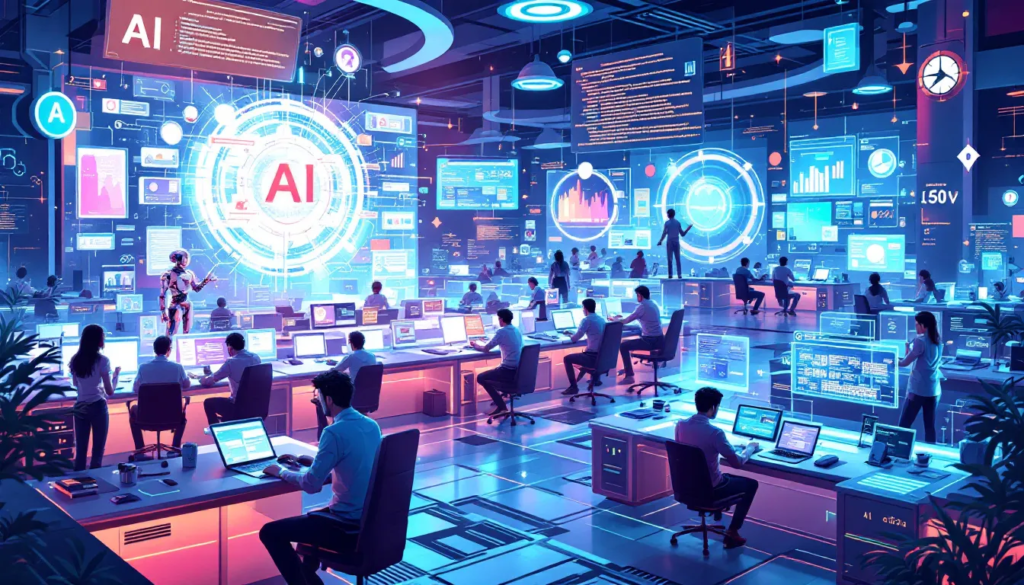
AI has become a powerful force in the realm of software development, transforming the way tasks are executed and enhancing overall productivity. Advanced ai automates repetitive tasks, enabling software developers to concentrate on more complex and creative aspects of their work. This not only boosts efficiency but also accelerates the software development lifecycle, leading to faster product creation.
AI tools are not just limited to automating mundane tasks; they also play a crucial role in code generation, bug detection, and optimize code DevOps processes, including reducing boilerplate code. These advancements are reshaping the responsibilities of software engineers, making their work more dynamic and less monotonous.
Examining these roles reveals how AI is transforming specific areas of software development.
Automating Repetitive Tasks
One of the most significant contributions of AI to software development is its ability to automate repetitive tasks. AI excels at generating code snippets, refactoring code, and assisting in bug detection and resolution. AI-powered tools enhance productivity by managing routine tasks, freeing developers to focus on more complex and critical aspects of software development.
This automation not only streamlines workflows but also fosters better collaboration among developers. AI tools can automatically generate test cases, provide auto-complete suggestions, and optimize the DevOps process, making it easier for teams to focus on innovation and problem-solving rather than mundane tasks.
Enhancing Code Generation
AI’s role in code generation is another transformative aspect of software development. AI tools can quickly generate code snippets, refactor existing code, and aid in both bug detection and resolution, thus minimizing the time spent on these routine tasks. This allows developers to write code faster and focus on more innovative tasks that require human creativity and critical thinking.
Developers must still thoroughly review AI-generated code to ensure quality and adherence to best practices. While AI can speed up the coding process, the human touch is indispensable for maintaining overall software quality and ensuring that the generated code aligns with specific project requirements.
Improving Bug Detection
AI-powered tools have made significant strides in enhancing bug detection. By analyzing code and generating test cases, AI can identify potential vulnerabilities early in the software development process. Machine learning techniques learn from past test results to predict areas of code likely to contain bugs, thereby streamlining the bug detection process.
The integration of machine learning models in software testing significantly enhances the detection of vulnerabilities and improves overall software quality, suggesting improvements. This proactive approach to bug detection not only saves time but also ensures that the final product is robust and reliable.
Human Creativity and Problem-Solving Skills
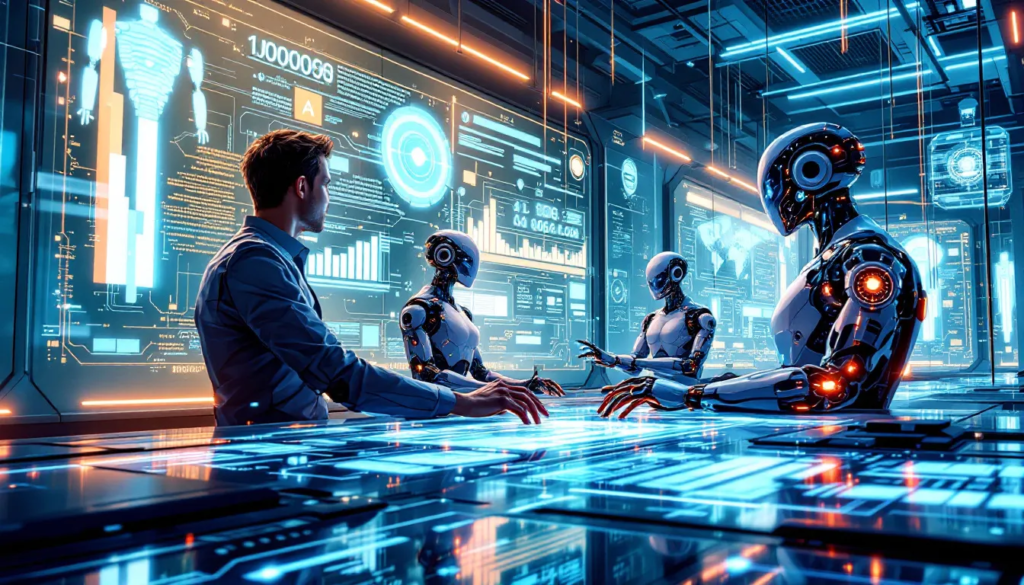
While AI handles routine tasks with ease, the essence of software development lies in human creativity and problem-solving skills. Software engineers are the creators who innovate and think outside the box, crafting user interfaces and solutions that resonate on an emotional and practical level. The instinctual adaptability of human software engineers allows them to respond to unique challenges creatively, a trait AI cannot replicate.
Concerns about AI replacing software engineers often stem from a misunderstanding of the current demand for quality software. The reality is that AI complements human skills, allowing engineers to focus on tasks that require creativity and critical thinking.
Exploring the creative edge and complex problem-solving aspects highlights the human role in software development.
The Creative Edge
Human creativity is the cornerstone of software engineering, enabling innovative solutions to complex problems. This creativity allows software engineers to craft user interfaces that reflect emotional depth and personal insight, creating user experiences that are not only functional but also engaging. The qualities of creativity and innovation are indispensable, distinguishing human software engineers from AI capabilities.
The competitive edge in the new era of software development lies in the ability to innovate and think critically. As AI continues to handle routine tasks, the focus shifts to creating unique and impactful solutions that meet business needs and enhance production metrics
Complex Problem Solving
Human creativity and the ability to solve complex problems remain crucial in software development, despite advances in AI. Companies seek engineers who can address complex issues that AI cannot resolve, making problem-solving skills a valuable asset. Software engineers fulfill critical roles such as designing algorithms, developing systems, and solving business problems, which require a deep understanding of the problem space and contextual knowledge.
Understanding the business side of software development enables engineers to make better decisions and prioritize tasks effectively. This holistic approach enhances their problem-solving capabilities, ensuring that the solutions they create are both technically sound and aligned with business objectives, including considerations of system design.
The Evolution of Coding Careers
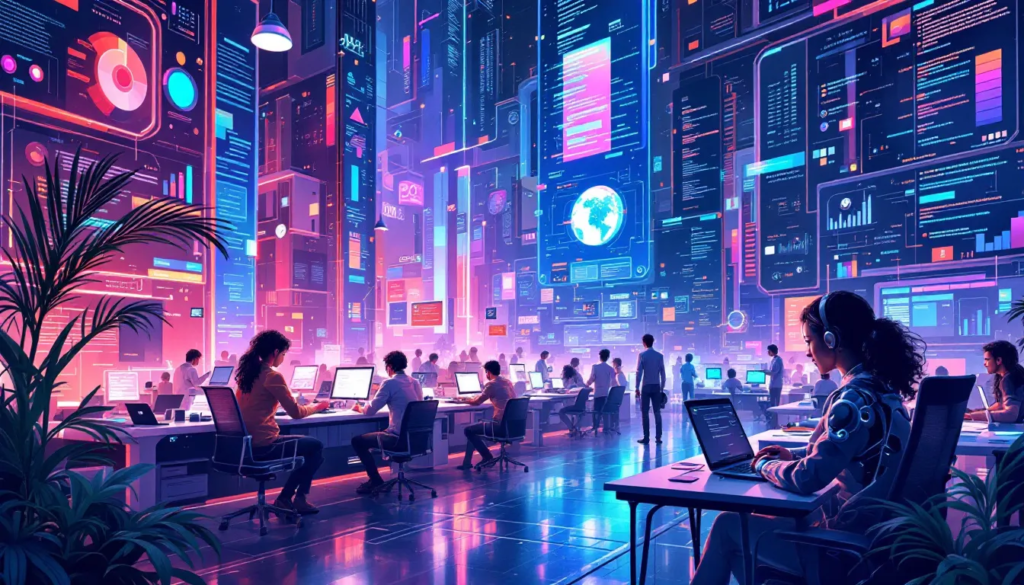
The rise of AI is redefining traditional career progressions in the tech industry, making entry-level roles less common. Software engineers must now focus on developing skills in artificial intelligence and leveraging AI tools to remain relevant. This evolution in coding careers requires a shift in mindset and a willingness to embrace new technologies.
Engineers should focus on utilizing AI tools effectively to enhance their career prospects. By adapting to the changing landscape and acquiring new skills, software developers and industry professionals can stay relevant, maintain their competitive edge, and thrive in an AI-driven job market.
Exploring the new skill sets required, the importance of adapting to AI tools, and the need for lifelong learning and adaptability is essential.
New Skill Sets for AI Era
In the AI era, essential technical skills for software developers include:
– Machine learning
– Data science
– Neural networks
– Deep learning
Future software engineers will need to adapt to new skills that emphasize data handling and AI integration. This new era requires software developers to become expert-generalists, focusing on cognitive computing and text analytics to thrive in AI-driven projects.
Acquiring these advanced skills positions software engineers as extremely good invaluable assets in the tech industry. This adaptability is crucial for staying relevant in a rapidly evolving job market for a software engineer.
Adapting to AI Tools
AI-based tools facilitate more efficient workflows, helping developers to enhance their skills and productivity. Integrating AI systems into workflows allows human software engineers to identify and fix issues early, resulting in higher-quality software. This adaptation to AI tools is essential for maintaining a competitive edge in the tech industry.
AI tools assist in task allocation, optimize project timelines, and enhance team communication. By embracing this tool, software engineers can streamline their workflows and focus on more complex and innovative software development tasks.
Lifelong Learning and Adaptability
The ability to learn new programming languages and frameworks is crucial for software engineers to remain competitive. Adapting to the evolving AI landscape requires a proactive mindset and willingness to embrace change. Participating in open-source initiatives helps developers build a portfolio that showcases their coding skills to potential employers.
Open-source contributions can lead to valuable professional connections, enhancing career growth opportunities. Building an AI-augmented portfolio through open-source contributions can enhance employability in a competitive job market.
The Impact on Team Dynamics
AI can be integrated into team workflows to enhance productivity and innovation. The collaboration with AI allows teams to streamline processes, reduce errors, and enhance project outcomes. However, the irreplaceable value of human interaction, communication, and collaboration continues to play a critical role in software development projects.
Balancing AI tools with human creativity and teamwork is essential for success in software engineering. Exploring how AI tools can enhance team collaboration and the importance of human interaction in team settings is crucial.
Collaboration with AI
AI-driven project management platforms optimize task allocation, predict potential roadblocks, and improve team communication. AI assists in forecasting project timelines, helping to reduce delays and improve decision-making for team leaders. These AI tools enhance communication and collaboration by breaking down silos in software development teams.
AI automates code review processes, ensuring consistent adherence to best practices, particularly for remote teams. Team collaboration and brainstorming are key elements that enhance creativity in software development.
Human Interaction in Teams
Effective communication and collaboration skills are increasingly important for software engineers because AI cannot easily replicate human interaction in teams. Human interaction remains vital, as AI struggles to replicate communication and emotional understanding within teams. Strong human interaction is vital for fostering trust and collaboration among team members in software development.
Effective problem-solving by software engineers often involves a deep understanding of both technical and business aspects. Human software engineers excel at understanding requirements and adapting solutions to solve problems based on contextual knowledge.
Addressing Common Concerns
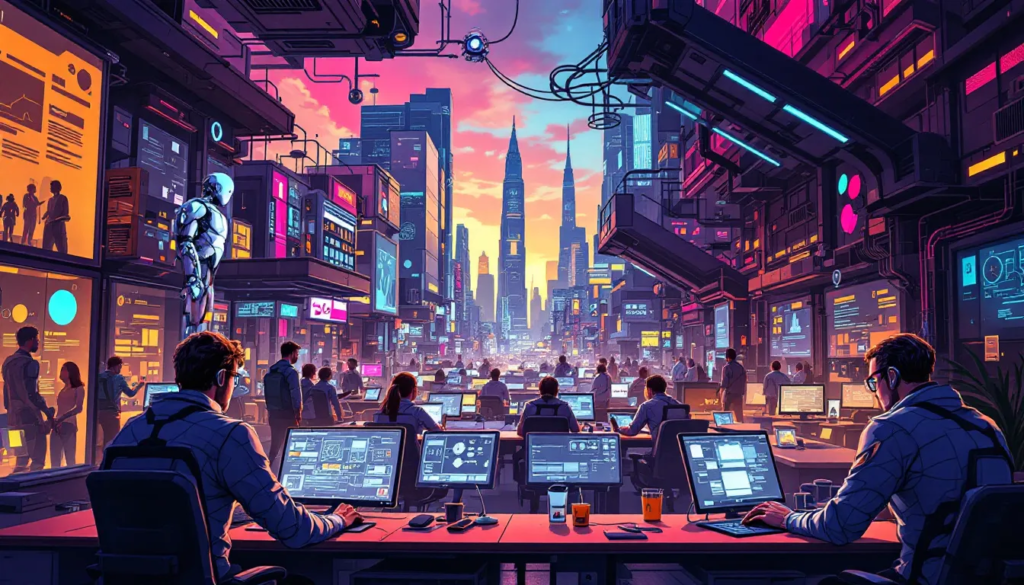
Some studies indicate that when AI tools are employed, developers may experience a decrease in productivity, taking longer to complete tasks than without AI assistance. However, many industry experts agree that AI will transform but not eliminate the role of software engineers. There are prevalent misconceptions and fears about AI completely taking over the role of software engineers.
Integrating AI into software engineering tasks enhances capabilities but underscores the ongoing need for human oversight and creativity. Addressing common concerns and myths about job displacement and the future of programming jobs is important.
Job Displacement Myths
Predictions suggest AI might replace some software developers by 2040, but this view is overly simplistic. Surveys indicate that around 30% of software developers fear that AI will take over their jobs. Skills such as creativity, critical thinking, and problem-solving remain crucial for software developers in an AI-driven landscape.
Many believe that AI will replace traditional programming jobs, but this is largely a myth. AI will complement rather than replace software engineers, emphasizing the importance of human attributes in problem-solving.
The Future of Programming Jobs
As AI tools evolve, they are expected to enhance the efficiency of software development rather than eliminate the need for software engineers. Despite the rise of AI, up to 80% of programming jobs are expected to remain focused on human-centric tasks. By 2027, a significant portion of software engineering teams will adopt software engineering intelligence platforms to enhance productivity.
The balance between AI capabilities and human creativity will be essential for the future of programming careers. The future of programming jobs will involve a collaborative effort between AI and human software engineers.
Preparing for the AI-Enhanced Future
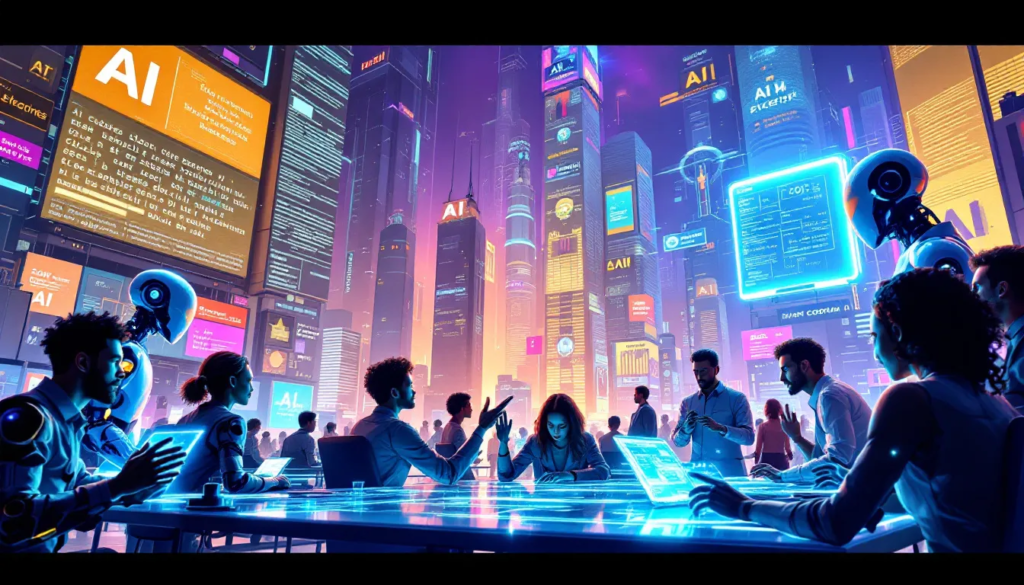
Continuous learning of emerging technologies is essential for developers to maintain relevance in a rapidly changing technical landscape. Concern over AI replacing software engineers is prevalent, but understanding its implications is essential for preparation. A recommended approach for future coders is to learn to leverage AI for a competitive edge.
Exploring upskilling strategies and the benefits of leveraging open-source projects to prepare for the AI-enhanced future is essential.
Upskilling Strategies
Participating in online courses and bootcamps focused on AI and machine learning can enhance a software engineer’s skill set. Learning advanced languages and frameworks specifically designed for AI significantly enhances a developer’s skill set. Entry-level software engineers are encouraged to learn about AI and machine learning tools, as these will be integral to future development workflows.
In today’s rapidly evolving tech landscape, upskilling in areas like AI and machine learning is crucial for software engineers to remain competitive.
Leveraging Open Source Projects
Contributing to open source projects allows developers to practice AI technologies in real-world scenarios. By participating in these projects, software engineers can gain practical experience and receive peer feedback on their code, which is invaluable for professional growth.
Open source contributions also foster community collaboration and networking opportunities, enhancing career growth. Building an AI-augmented portfolio through open source contributions can enhance employability in a competitive job market.
Summary
In summary, AI is transforming software development by automating repetitive tasks, enhancing code generation, and improving bug detection. However, the creative and problem-solving skills of human software engineers remain irreplaceable. As coding careers evolve, new skills and a focus on lifelong learning will be essential for staying competitive.
The future of software engineering lies in the symbiotic relationship between AI tools and human ingenuity. By embracing AI and continuously upskilling, software engineers can ensure a future where technology and creativity thrive together.
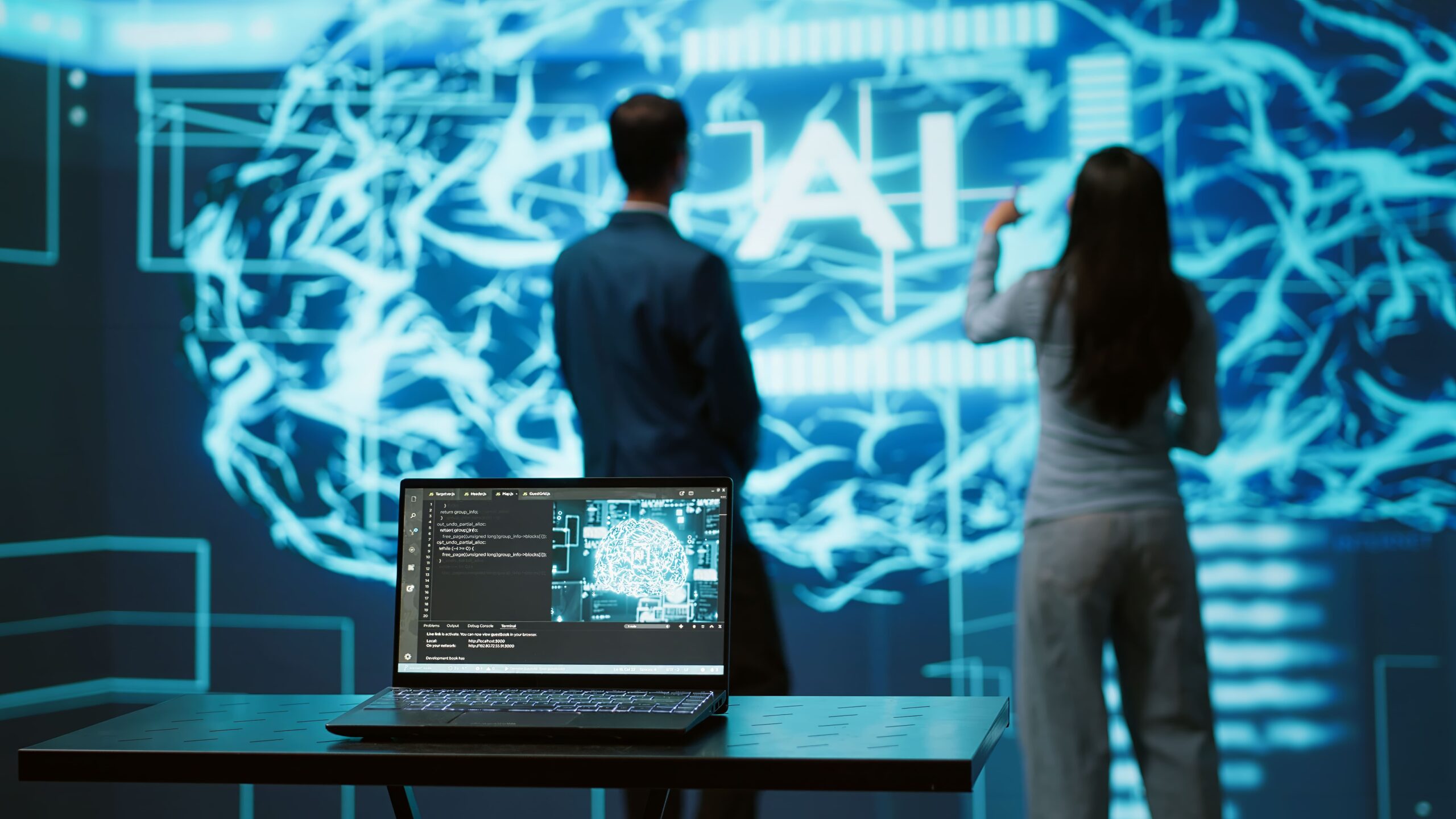
Leave a Reply